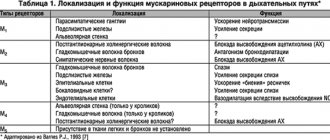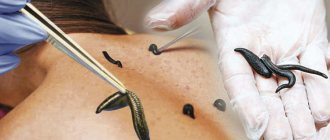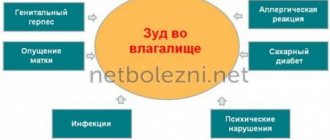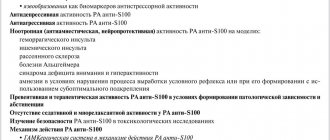Colchicin Lirca
Acute intoxication has been observed in adults after taking a dose of about 20 mg and in children after taking a dose of 5 mg. Chronic toxicity may occur in patients with gout after taking a total dose of 10 mg or higher over several days.
Since colchicine has antimitotic activity, organs that are characterized by a high proliferation rate are more often affected.
Symptoms of colchicine intoxication.
Approximately 2-6 hours after ingestion of a toxic dose, burning and soreness in the throat and mouth, urge to vomit and difficulty swallowing, nausea, thirst and vomiting are noted, and after that - urge to urinate and defecate, tenesmus and colic (usually , in malnourished patients). Muco-watery and/or hemorrhagic diarrhea may lead to loss of fluid and electrolytes, resulting in the development of hypokalemia, hyponatremia and metabolic acidosis. Often patients complain of both tightness and pain in the heart area. Subsequently, pallor, decreased body temperature, cyanosis and dyspnea are observed. The development of tachycardia and arterial hypotension (up to collapse) is possible.
Neurological disorders manifest themselves in the form of decreased sensitivity, seizures and symptoms of paralysis. Death is possible in the first three days due to cardiovascular failure and respiratory paralysis.
1 - 2 weeks after treatment of intoxication, complete, sometimes long-term alopecia may be observed. In some cases, dysfunction of the kidneys, lungs and liver was observed. Rare cases of blindness have been reported.
Treatment of intoxication.
Treatment is carried out in a poison control center. There is no specific antidote. Hemodialysis is ineffective. Gastric lavage, control of the airway, auxiliary ventilation, monitoring and maintenance of vital functions, normalization of blood gas composition, electrolyte balance, and anti-shock measures are necessary. Treatment is symptomatic, aimed at stabilizing and maintaining the cardiovascular system and basic vital functions: infusion therapy, cardiac glycosides to maintain myocardial contractility if necessary. For abdominal cramps, atropine, papaverine or tannalbine are prescribed. Opiates should not be used.
Special instructions and precautions
There is little difference between the effective dose of colchicine and the dose that causes symptoms of toxicity, meaning that even a small increase in dose can cause acute symptoms of drug toxicity. If you experience symptoms such as nausea, vomiting, abdominal pain, and diarrhea, stop taking colchicine and call your doctor immediately.
Talk to your doctor or pharmacist before using this medicine. if you have or have had one or more of the following conditions in the past.
- if you have problems with the liver and kidneys
- if you have cardiovascular disease
- if you have problems with the gastrointestinal tract
- if you are an elderly and weak person
- if you have a blood disorder.
Colchicine may cause acute bone marrow depression (loss of some white blood cells (agranulocytosis), platelet deficiency (thrombocytopenia), decreased red blood cell count and hemoglobin due to insufficient red blood cell production (aplastic anemia).
You will need to have regular blood tests to monitor any changes.
If you experience symptoms such as fever, sore mouth, sore throat, prolonged bleeding, bruising, or skin problems, stop taking this medication and call your doctor immediately. These may be signs of a serious blood problem and your doctor may direct you to get blood tests immediately.
Long-term use of colchicine can lead to vitamin B12 deficiency.
Children and teenagers under 18 years of age
Colchicine should be prescribed to children only under the supervision of a medical specialist. There is no data on the effect of long-term use of colchicine on the body of children.
Other drugs and Colchicine
Tell your doctor or pharmacist if you are taking, have recently taken, or may start taking any other medications.
In case of long-term treatment, regularly monitor blood counts. If you have liver or kidney disease, consult your doctor before taking this drug.
When you use colchicine with the following drugs, you are more likely to experience side effects and these may be severe. You should talk to your doctor or pharmacist if you are taking:
- erythromycin, telithromycin, clarithromycin, and azithromycin (some antibiotics, medicines used to treat bacterial infections). The use of these antibiotics during treatment with colchicine may cause intoxication. If possible, do not take these antibiotics while being treated with colchicine. If treatment with other drugs is not possible, the doctor should reduce the dose of colchicine and constantly monitor your condition.
- ketoconazole, itraconazole, voriconazole (antifungal drugs). You should not use these drugs while you are being treated with colchicine.
- ritonavir, atazanavir, amprenavir, saquinavir, nelfinavir, fosamprenavir and indinavir (protease inhibitors used to treat HIV infection). You should not use these medicines while being treated with colchicine.
- verapamil, quinidine and diltiazem (medicines used to treat heart disease).
- cyclosporine (immunosuppressant).
Tell your doctor or pharmacist if you are taking any of the following drugs:
Taking the following medications while being treated with colchicine may cause serious muscle disease (myopathy) and muscle tissue breakdown, which is accompanied by muscle cramps, fever, and a red-brown discoloration of the urine (rhabdomyolysis):
- simvastatin, fluvastatin, or pravastatin (statins, medications used to lower cholesterol)
- fibrates (medicines that lower cholesterol and some fats in the blood)
- digoxin (a medicine used to treat heart failure and arrhythmias).
- cimetidine (used to treat intestinal or stomach ulcers) and tolbutamide (used to lower blood sugar). They may enhance the effects of colchicine.
- vitamin B12 (cyanocobalamin). Colchicine may reduce the absorption of vitamin B12 from the gastrointestinal tract.
Taking Colchicine with food and drinks
Do not drink grapefruit juice while taking colchicine.
Pregnancy, breastfeeding and fertility
If you are pregnant or breastfeeding, think you may be pregnant, or are planning to become pregnant, consult your doctor or pharmacist before using this medicine.
Women of childbearing age
Treatment of gout
Women of childbearing potential should use effective contraception for and for at least 3 months after stopping colchicine treatment for gout. If pregnancy nevertheless occurs during this period of time, genetic counseling should be performed.
Pregnancy
Gout treatment:
You should not use colchicine if you are pregnant or plan to become pregnant. If, however, pregnancy occurs during treatment with colchicine or within 3 months after stopping treatment, genetic counseling should be considered.
Treatment of familial Mediterranean fever (periodic disease):
Because familial Mediterranean fever (periodic disease) without treatment with colchicine may also adversely affect pregnancy, the use of colchicine during pregnancy should be weighed against the potential risks and may be considered if there is a specific clinical need.
Lactation
Colchicine passes into breast milk.
Nursing mothers with gout should not take colchicine.
A decision must be made to stop breastfeeding or discontinue colchicine therapy, taking into account the benefits of breastfeeding for the child and the benefits of colchicine therapy for the woman.
Fertility
Gout treatment:
Male patients should not have a child during and for at least 6 months after discontinuation of colchicine therapy. If a woman does become pregnant during this period of time, genetic counseling should be performed.
Treatment of familial Mediterranean fever (periodic disease):
Because familial Mediterranean fever (FME) without treatment with colchicine can also lead to infertility, the use of colchicine should be weighed against the potential risks and may be considered if there is a specific clinical need.
Driving vehicles and operating machinery
There is no data on the effect of colchicine on the ability to drive vehicles and machines.
However, the possibility of drowsiness and dizziness should be taken into account.
Important information about some of the ingredients in Colchicine.
The drug contains sucrose. If your doctor has told you that you have an intolerance to certain sugars, contact your doctor before taking this medicine. Colchicine 1 mg tablets contains the dye E124, which can cause allergic reactions.
This medicine contains less than 1 mmol (39 mg) sodium per tablet, i.e., in fact, “sodium free”
Main indications
The drug colchicil is most often prescribed for the treatment of gout. This disease is characterized by acute joint pain due to impaired uric acid metabolism and the deposition of urate in tissues. The drug is indicated for relieving pain during exacerbation of the disease and slowing its progression.
In addition, colchicil is used, the instructions for use focus on this, for the treatment of other pathologies:
- Amyloidosis, when a complex protein-polysaccharide compound, amyloid, is deposited in tissues. This leads to malfunctions in almost all systems and organs in the body.
- Inflammatory diseases in otorhinolaryngology and dentistry.
- Mediterranean fever, which is a hereditary disease and is associated with the deposition of amyloid in tissues. The main symptom is a periodic sudden increase in body temperature and severe chills.
- Phlebitis. In this case, inflammation of the venous wall occurs against the background of pathologies of an infectious and inflammatory nature.
- Scleroderma. The disease is characterized by the appearance of scar tissue on the skin and internal organs.
- Chondrocalcinosis. In pathology, calcium pyrophosphate crystals are deposited in the area of the articular cartilage and bursa, which causes pain.
Colchicine tablets, instructions for use (Method and dosage)
The tablets are taken orally.
Inflammatory process, gout : on the first day of therapy 3 times a day, 1 mg; on the second and third days of therapy, a double dose of 1 mg is prescribed; from the fourth day of treatment, 1 mg in the evening is indicated. Treatment is possible according to an alternative regimen: an initial dosage of 1 mg, then switch to taking 0.5-1.5 mg, the interval between doses is 2 hours until the pain disappears.
Prevention of gout : take 1 mg in the evening for three months, effective for gout without tophi. No more than 8 mg per day.
According to the instructions for use of Colchicine, the duration of therapy for amyloidosis is 5 years, 1-1.5 mg per day is taken daily.
Contraindications for use
Colchicil should not be taken if you are hypersensitive to any component of the drug. This means that you need to carefully study what ingredients were used in the production of the tablets.
The drug is not prescribed for severe pathologies of the digestive system. Contraindications also apply to neutropenia, when the blood formula is disturbed. Elderly patients should be treated with colchicil with caution. You should not take the medicine in the following cases:
- Confirmed alcoholism.
- Presence of purulent infections.
- Bone marrow pathologies.
- Liver and kidney diseases.
Due to possible negative effects on the fetus, colchicil is not prescribed, the instructions confirm this, during pregnancy. The drug is contraindicated for patients undergoing hemodialysis treatment. No studies have been conducted on the effect of colchicil on a newborn baby during breastfeeding, so it is better not to use it for treatment.
Features of the drug
Colchicine, which affects uric acid metabolism, is produced on a plant basis. The active ingredient of the same name in the drug is isolated from Colchicum splendid. This herbaceous plant has been used in folk medicine for a long time to reduce joint pain and prevent the progression of inflammatory processes.
The drug is produced in tablet form. They are most often white, but sometimes have a slightly yellowish tint. Round, biconvex tablets are scored, which makes it easier to adhere to the prescribed dosage.
The medicine has analgesic and anti-inflammatory effects. After taking it, it is possible to quickly stop an acute attack of gout. In addition, the active substance delays the deposition of uric acid microcrystals in tissues.
Interaction
The likelihood of developing myopathy increases in patients with pathology of the renal system while taking Cyclosporine .
Colchicine can be taken in combination therapy with uricosuric medications and Allopurinol .
The drug enhances the effectiveness of sympathomimetic and depressive agents.
Colchicine interferes with the absorption process of Cyanocobalamin .
Thrombocytopenia and leukopenia develop when taking NSAIDs and medications that cause myelodepression .
Drugs that acidify urine and cytostatics reduce the anti-gout activity of the drug. The opposite effect is recorded when taking alkalizing agents.
Possible adverse reactions
Colchicil, the price of which is quite reasonable, as confirmed by reviews and manufacturers warn, has many side effects. This means that you cannot make a decision about drug treatment on your own.
Most often, when taking the drug, negative reactions from the digestive system are observed. These are various dyspeptic disorders: nausea, vomiting, diarrhea, etc. Such symptoms are accompanied by abdominal pain. Additionally, various problems arise with the functioning of the urinary system.
Less commonly, other side effects occur during treatment with the drug:
- The functioning of the hematopoietic system is disrupted. In severe cases, with long-term use, agranulocytosis develops.
- Dermatological reactions occur. In severe cases, long-term use causes alopecia.
Drinking alcoholic beverages can cause serious side effects.
Pharmacodynamics and pharmacokinetics
The principle of action is based on inhibition of the process of phagocytosis of microcrystals of uric acid salts, on reducing the rate of migration of leukocytes to the site of inflammation. Colchicine suppresses (partially or completely) the process of cell division at the metaphase and anaphase stages, has an antimitotic effect, and prevents degranulation of neutrophils.
The drug prevents the development of amyloidosis by reducing the formation of amyloid fibrils . Highly effective in relieving attacks of acute gout. 75% of patients experience improvement in well-being within the first 12 hours of treatment. In 80% of patients, adverse reactions from the digestive system are recorded.
Intravenous administration of the drug allows you to avoid adverse reactions from the gastrointestinal tract and accelerate the onset of the clinical effect. The likelihood of repeated acute attacks of gout is reduced by ¾ of patients when taking 1-2 mg of colchicine daily.
The medication reduces the activity of dopamine beta-hydroxylase and helps prevent acute attacks in patients with familial Mediterranean fever . In patients with primary AL amyloidosis, Colchicine increases life expectancy.
For systemic scleroderma, the drug has a positive effect on the skin, reduces dryness, and softens the skin.
Side effects
Digestive tract: nausea, malabsorption syndrome , increased liver enzymes, vomiting, decreased appetite, epigastric pain, diarrhea syndrome vitamin B12 deficiency .
Nervous system: neuropathy , peripheral neuritis , depression .
Hematopoietic organs: thrombocytopenia , neutropenia (agranulocytosis) , aplastic anemia , leukopenia .
Allergic response in the form of measles-like rash , urticaria .
Local reactions manifest themselves in the form of necrosis of surrounding tissues and irritation at the injection site.
Myopathy , azoospermia , disturbances in the renal system, and temporary alopecia are also noted .








